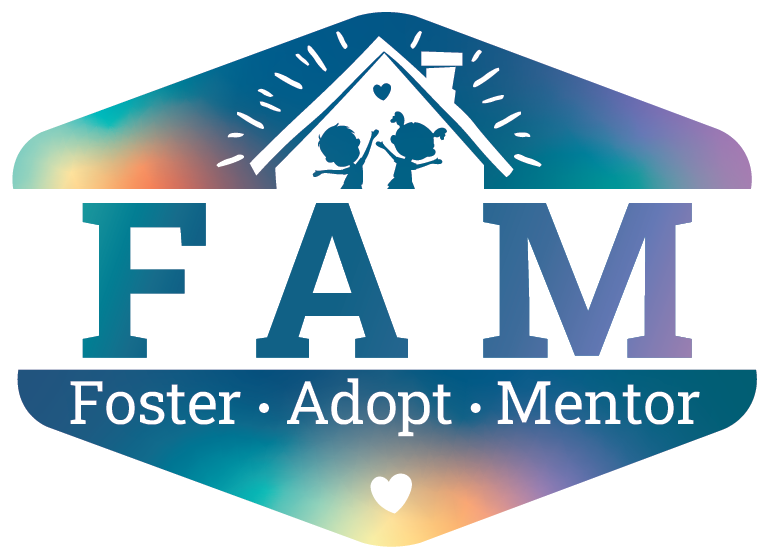The Never-Ending Demand For
Nurturing Foster Families
Foster parents are always in high demand—especially those who bring diverse cultural backgrounds and life experiences!
In Washoe County alone, there are over 600 children in the foster care system but fewer than 400 foster families. Your involvement can help bridge this critical gap and change a child’s life for the better.
FAM provides a wide range of comprehensive programs and resources to support foster parents. We guide you through every step of becoming a licensed foster parent, adoptive parent, or mentor. Our family-friendly, child-centered approach ensures you’re equipped with the tools and support needed to thrive.
As you progress through the approval process, you’ll be considered for the placement of children in need of safe, loving homes through the child welfare agency.
GETTING STARTED
Watch Our Information Session
Thinking about getting involved? Watch our quick info session to learn what it’s all about, how you can make a difference, and what steps to take next. It’s an easy way to get the answers you need—and see if this is the right path for you!
KEY REQUIREMENTS
Foster Parent Eligibility
A foster parent offers a safe, stable, and loving home for children who are unable to remain with their biological parents due to abuse or neglect. The mission of the Washoe County Human Services Agency (WCHSA) is to reunite children with their families whenever it is safe and possible. Foster and adoptive parents play a crucial role in making this goal a reality, providing the support and care children need during this critical time.
Age & Housing Requirements
Foster parents need to be 21 or older and have a safe, stable place to live—this could be a rented apartment, an owned home, a condo, or any other secure residence.
Financial & Personal Criteria
You must have sufficient income to meet your financial needs. We welcome applicants of any marital status (single, married, or in a domestic partnership), race, ethnicity, or sexual orientation (LGBTQIA).
Child Care & Support
You must provide a child with their own bed and space for their belongings. Additionally, you should support the child’s connections to their family, culture, religion, and ethnicity.
Collaboration & Commitment
You must be willing to work with WCHSA staff to ensure the best care for the child and be ready to open your heart and home to children in need.
Supporting foster children
Types Of Foster Care
When a child’s safety and well-being cannot be ensured at home, substitute care may be needed. WCHSA recruits, trains, licenses, and retains families who can meet the child’s needs. The goal is to reunite the child with their birth family, unless another arrangement is in the child’s best interest.
Relative & Kinship Foster Care
Relative or kinship foster care places children with relatives or close family friends to maintain connections. While preferred, child safety is the top priority, and HSA will prioritize safety if concerns arise. Relatives can waive support or become licensed to receive foster care payments.
Contract Foster Care
Non-kinship foster parents must be licensed, meet NRS and NAC requirements, complete 18 hours of training, have liability insurance, and sign the County Agreement. Licensed parents will receive monthly payments
Specialized & Respite Foster Care
Specialized Foster Care offers a family-based approach with mental health and targeted treatments. Foster parents receive training and support from qualified staff.
Respite Care provides temporary relief for resource parents. It lasts from one hour to 14 days, offering breaks for foster families.
Emergency, Non-Minor, & Special Medical Foster Care
Emergency Foster Homes provide short-term care for children and youth, up to 30 days, while longer-term solutions are found. Non-Minor Dependents are young adults, ages 18 to 21, working on career or educational goals. They need family support as they pursue their ambitions. Special Medical Foster Care supports children with medical conditions. It offers specialized training and ongoing support for foster parents.
The Diverse Needs Of Children In Care
Hundreds of children in Washoe County are in need of a loving, stable family and home. These children come from all backgrounds and ages, with siblings and often facing behavioral or medical challenges. Despite their circumstances, they are no different from children not in care—they learn, grow, enjoy spending time with friends, and crave the love and stability that a family provides. As a foster parent, you can make a difference by offering them the home and security they deserve.

Children with Behavioral Issues
These children need therapeutic support in addition to quality parenting due to the extreme trauma they have experienced, which can include neglect, abuse, abandonment, and instability.

Sibling
Sets
Siblings thrive when they are able to stay together, offering each other comfort. Foster parents are needed to enhance these connections and alleviate the children’s emotional pain and trauma.

Teens
Teens are often the hardest to place in foster and adoptive homes. They thrive with families who support their unique needs, set healthy boundaries, and build positive relationships. Many teens also need mentors.

Children with Medical Needs
These children need loving parents committed to caring and supporting them with their special medical needs. Specialized training and support are available to foster parents.
Be a lifeline
Become A Foster Parent
Foster parents provide children with a safe, nurturing home until a permanent placement is found. If you’re interested in becoming a foster parent in Washoe County, you’ll need to meet specific requirements established by the Washoe County Human Services Agency. This process ensures you’re fully equipped to offer the care and support children need. By becoming a foster parent, you have the opportunity to make a lasting, positive impact on a child’s life.
Complete Application & Background Check
Prospective foster parents who attended an information session and wish to proceed must submit all required documentation. WCHSA will help you submit electronic fingerprints (Live Scan) and provide assistance with criminal background clearance.
Pre-Service Training
Prospective foster parents must complete 18 hours of the Have a Heart pre-service training, designed to equip them with the skills to care for children in foster care who have experienced trauma. Additional training is available for those interested in specific child populations.
Home Study & Licensing
A WCHSA home study contractor will visit to assess your home’s safety and suitability for fostering. They’ll discuss your family’s background, childcare experience, and ideal child placements. A WCHSA licensing worker will review your home study, complete the final inspection, and address any questions.
Contract Approval & Placement
Once you meet all requirements and are licensed, you’ll sign a contract with WCHSA and be listed as an available foster home. You’ll then be contacted for potential child placements and have access to additional support services, including financial, medical assistance, respite care, and support groups.
F.A.Q.
Frequently Asked Questions
Our goal is to help families become licensed within 90 days. However, the timeline may vary depending on each family’s circumstances and involvement in the process. On average, a child’s stay in foster care ranges from six to eighteen months, but this can differ based on individual situations.
Yes, foster parents receive a monthly foster care payment to aid with the child (ren’s) needs. All foster youth have medical insurance.
Yes, during the application and home study process, you will specify the number, age, and gender of the children you wish to care for. Contact with birth parents is determined on a case-by-case basis, with reunification typically being the goal. Foster parents are expected to transport children to visits with birth parents and foster a positive co-parenting relationship for the child’s benefit.
When children enter foster care, they undergo significant changes. To provide some stability, they are typically expected to remain in their school of origin.

“Being in foster care is hard sometimes, but it does show me that there are people who care.”

